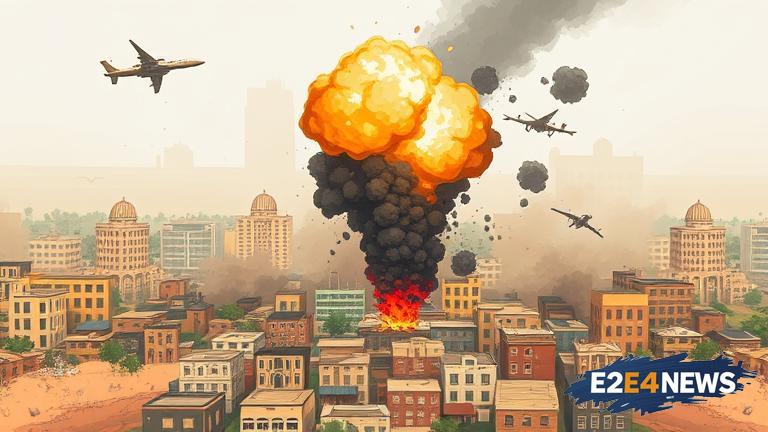The North Darfur capital, also known as Al-Fashir, has been under intense bombardment, resulting in widespread destruction and loss of life. The situation has been exacerbated by ethnic killings, which have further fueled the humanitarian crisis. Thousands of people have been displaced, and many are in dire need of food, shelter, and medical aid. The bombardment has targeted civilian areas, including homes, schools, and hospitals, leaving many without access to basic necessities. The ethnic killings have been particularly devastating, with reports of entire families being killed or injured. The situation has been described as ‘apocalyptic’ by aid workers, who are struggling to reach affected areas due to the ongoing violence. The Sudanese government has been accused of being complicit in the violence, with some reports suggesting that government forces have been involved in the bombardment and ethnic killings. The international community has been criticized for not doing enough to address the crisis, with many calling for increased humanitarian aid and diplomatic pressure on the Sudanese government. The humanitarian crisis in North Darfur is not new, with the region having faced years of conflict and displacement. However, the current situation is particularly dire, with the UN warning of a potential famine if aid is not delivered quickly. The crisis has also had a significant impact on the regional economy, with trade and commerce severely disrupted. The African Union has called for an immediate ceasefire and the deployment of peacekeeping troops to the region. The European Union has also announced plans to increase humanitarian aid to the region, but many are calling for more to be done. The situation in North Darfur is a stark reminder of the ongoing conflict and humanitarian crises in Sudan, which have left millions displaced and in need of aid. The international community must take immediate action to address the crisis and prevent further suffering. The people of North Darfur are in desperate need of aid, and it is the responsibility of the international community to provide it. The crisis in North Darfur is a complex one, with deep-rooted causes and consequences. It will require a sustained and coordinated effort to resolve, but it is imperative that action is taken now to prevent further suffering. The humanitarian crisis in North Darfur is a stark reminder of the need for increased diplomacy and cooperation to address the root causes of conflict and humanitarian crises. The international community must work together to find a lasting solution to the crisis and prevent further humanitarian disasters. The situation in North Darfur is a call to action, and it is imperative that the international community responds quickly and decisively to address the crisis. The people of North Darfur are counting on it, and it is our responsibility to act. The crisis in North Darfur is a humanitarian emergency that requires immediate attention and action. The international community must come together to provide aid, support, and protection to those affected by the crisis. The situation in North Darfur is a reminder of the importance of diplomacy, cooperation, and humanitarian aid in preventing and responding to humanitarian crises. The international community must learn from the crisis in North Darfur and work towards preventing similar crises in the future. The people of North Darfur deserve our support and assistance, and it is our responsibility to provide it. The crisis in North Darfur will not be resolved overnight, but with sustained effort and cooperation, it is possible to prevent further suffering and find a lasting solution. The international community must remain committed to addressing the crisis and providing support to those affected. The situation in North Darfur is a challenge to the international community, and it is imperative that we respond with urgency and compassion. The people of North Darfur are waiting for our help, and it is our responsibility to act.
